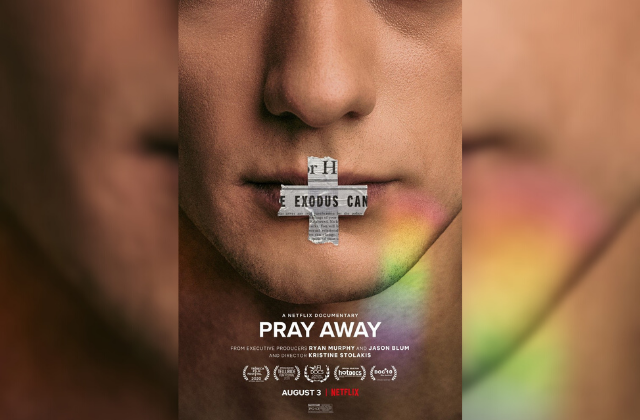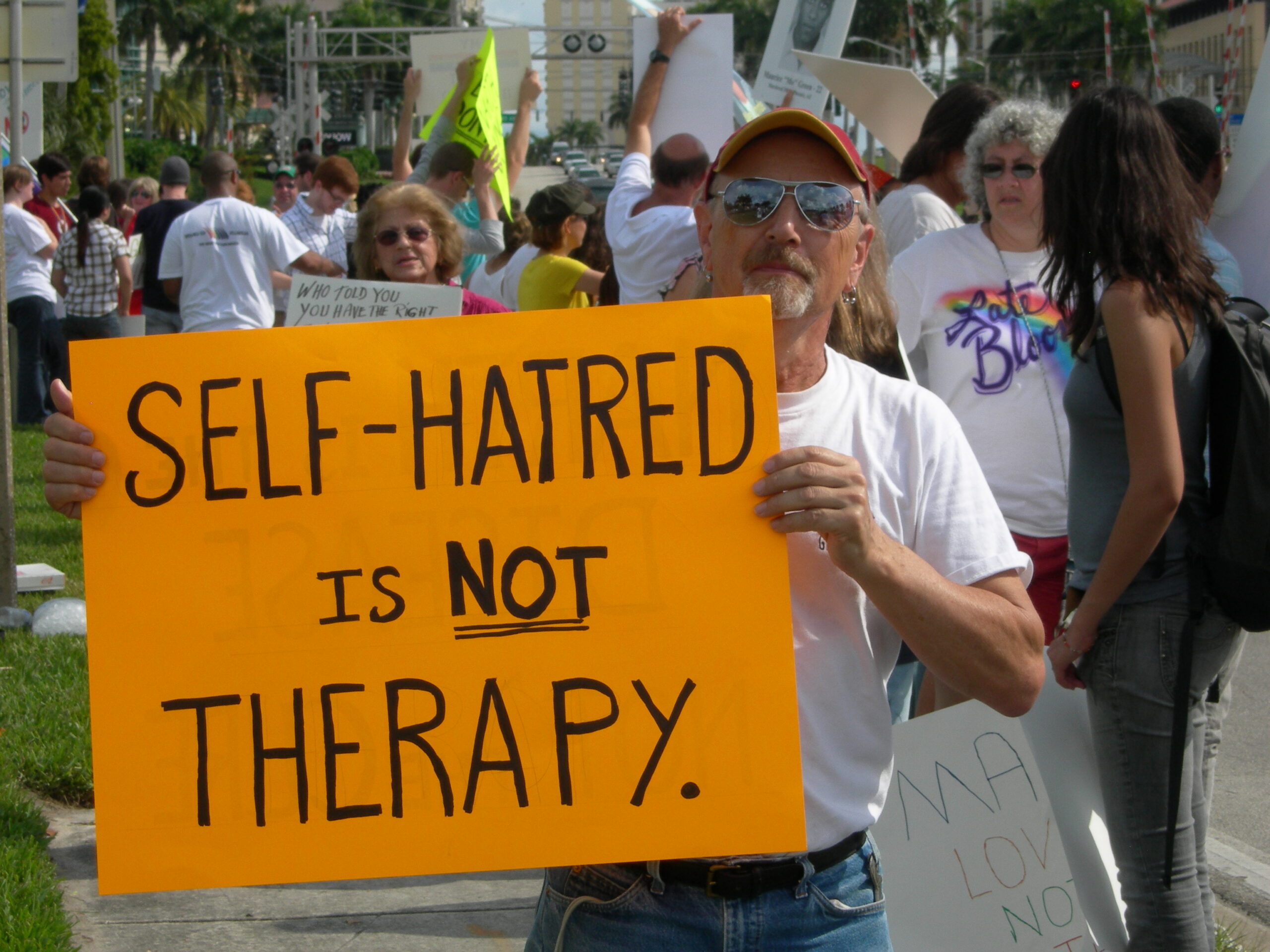Blog Post
Netflix’s Pray Away documentary, Sam Allberry, and conversion therapy
By Jonathon Van Maren
For decades, most assumed that the logical conclusion of the gay rights movement would be the redefinition of marriage. From the initial decriminalization of homosexual behavior to the implementation of LGBT ideology in public schools to the total colonization of the entertainment industry, academia, and politics (and even so-called “conservative” parties across the Anglosphere), their victory has been total. But social movements become industries, and it turns out that the LGBT activists have a Phase Two in mind: Targeting those who disagree with them and making it illegal to assist anyone with unwanted same-sex attraction.
To further this agenda, Netflix released the documentary Pray Away on June 16, 2021, to widespread critical acclaim. Pray Away is a viscerally powerful piece of propaganda. I’ve made this point before: Nobody beats progressives for storytelling with primal appeal, and LGBT stories are all the rage these days. (The story of how the storytellers joined the revolution is told in the recent five-part documentary Visible: Out on Television.) Storytelling like this is a key reason that progressives are winning the culture.
Pray Away highlights the stories of same-sex attracted Christians who had horrible experiences with so-called “conversion therapy”; it highlights their personal pain and tortured attempts to become heterosexual; it documents the stories of those “ex-gay” leaders who eventually returned to or embraced the LGBT lifestyle. Like other documentaries of this genre (such as 8: The Mormon Proposition) Pray Away contrasts the pronouncements of Christian leaders with the suffering of the same-sex attracted. They only find happiness when they abandon attempts at change and embrace same-sex relationships.
It bears mentioning here that even the framing used by the filmmakers is an indication of how successful the LGBT movement has been. The only reason that featured quotes from Religious Right figures such as Dr. James Dobson and Rev. Jerry Falwell sound so jarring is because the idea that homosexual behavior is sinful has been so totally rejected by the culture. (I realize, as I write this in a coffee shop, that I am sitting across from an enormous rainbow flag replete with the transgender symbol hanging on the wall. The LGBT movement’s corporate sponsors include nearly every major company in North America.)
The film opens with footage of Jeffrey McCall, a former transgender person who “de-transitioned” and now leads the “Freedom March,” an event that seeks to amplify the voices of those who have left the LGBT lifestyle. McCall, incidentally, objects to his portrayal in the film; while the stories of those who ended up leaving traditional Christianity are highlighted, McCall’s personal testimony is left out (although he is treated respectfully by the filmmakers.) I actually interviewed McCall some time ago; his story is extraordinary and well-worth hearing. It is also an inconvenient perspective for the filmmakers of Pray Away, as is that of folks like Dr. Christopher Yuan.
The key target of Pray Away is Exodus International, a non-profit Christian organization led by “ex-gays” who sought to “help people who wished to limit their homosexual desires.” Founded in 1976, Exodus International advocated for “conversion therapy”—the idea that same-sex attracted people could “go straight”—for decades. Many prominent leaders within Exodus eventually left and returned to the LGBT lifestyle, including John Paulk, who famously married a woman, raised a family, wrote a book, and was then caught in a gay nightclub by activists who outed him. Paulk is interviewed for the documentary, as are several others who spoke to the fundamental failures of Exodus. In 2012, then-president Alan Chambers renounced conversion therapy as harmful and shut the organization down.
To better understand how Christians should respond to the issue of “conversion therapy” and those with same-sex attraction more generally, I reached out to Sam Allberry, a pastor, apologist, and speaker who has written several essential books on the subject including What God Has to Say About Our Bodies, Why Does God Care Who I Sleep With, and Is God Anti-Gay? Allberry has been open about his own struggles with same-sex attraction (and has written a phenomenal book 7 Myths about Singleness) and observes that the church has traditionally done a terrible job responding to this issue. Ministries such as Exodus International, he notes, made promises to people that were extrabiblical.
“Anytime you’ve got a ministry that’s making promises God hasn’t made in the Bible, or is inflating promises God has made, when that ministry eventually comes short—as it will because if God didn’t promise something, the ministry isn’t ultimately going to be able to deliver it—people say, ‘Well, clearly the Bible is wrong,’” Allberry told me. “Well actually, the issue wasn’t what God promises, it is what they were saying God promises. I want Exodus International to receive the blame for the folding of Exodus International, I don’t want biblical Christianity to receive the blame. I don’t think Exodus International was expressing biblical Christianity. It was promising things God never said He would do.”
“God never promised, in the New Testament, that one aspect of Christian maturity is that you will never experience same-sex attraction. God never promises that an entailment of growing in holiness is an increasing attraction to the other sex. One lesson is: Let’s not throw biblical Christianity out of the window because people were promoting a twisted form of it, whether that’s the health and wealth people, whether that’s reparative therapy, or purity culture. It’s a skewing of what the Bible says.”
One of the key assumptions underlying Exodus International’s conversion therapy, Allberry observes, is the idea that “heterosexual marriage is the goal of the Christian life and so we’ve got to get you heterosexual and marriable, or the implication is that you’ll always be hindered as a Christian and will not live a full Christian life. There’s also often an assumption that same-sex attraction is always a developmental issue, and therefore if we can just track back to what went wrong, counsel into that, undo it, we can get you back on the heterosexual main road. I think we’re more complicated as human beings than just reducing this to one aspect of our early childhood or experience. It lacks theological and pastoral sophistication and was borne of an over-exaltation of marriage and a naivete about how God works in people’s lives.”
When confronted with mistakes that are being utilized for political purposes—such as LGBT activists pointing to the harms of some forms of “conversion therapy” to pass sweeping bans that even include praying for someone—Christians are often tempted to be defensive rather than introspective. Allberry believes we should resist this impulse. “The very architecture of the Gospel has a built-in mechanism that anticipates that we will make ongoing mistakes. It doesn’t harm the witness of the Gospel for us to come clean when we’ve done something badly. Confessing sin and repentance doesn’t undermine the public credibility of the Gospel, it adorns it. When it comes to this in particular, it is good for us to acknowledge that there are things that we as a broader Christian community have done over the years that are not right—not because secular culture says its wrong, but because it lacks biblical nuance and biblical wisdom.”
Some of those mistakes, especially regarding conversion therapy, have been sinful as well as misguided. “I’ve had many hundreds, if not thousands of pastoral encounters over the past ten years speaking into this area,” Allberry told me. “There have been so many people who have done some form of reparative therapy where part of it was, they were being encouraged to look at heterosexual pornography in order to awaken some kind of heterosexual desire. To think that one sin could cure another sin is a wicked thing to do. They are trying to resist one sin and are invited to pursue another sin. This isn’t just wrong; it’s appalling pastoral negligence.”
“All of us have disordered sexual desires. It’s not as if there’s a group of us who are ‘fine’ sexually and they’re called heterosexuals, and there’s this other, smaller group where everything is askew and that’s gay people, lesbian people, bisexual people, and they’re the ones that need to be fixed. No heterosexual person I’ve met hasn’t been fallen in their heterosexuality. People I know who are happily and healthily married still have temptations, still have to wrestle to be pure. So the idea that if we can just make people heterosexual and that’ll make them okay is theologically distorted. The Bible very clearly prohibits same-sex relationships. It doesn’t prohibit relationships between a man and a woman, but it does prohibit many types of relationships between a man and a woman.”
To assist those struggling with all sorts of sexual sins and temptations, Allberry says, churches must be safe spaces to confess sin and seek assistance in struggles. “Healthy churches are not ones without sin, but ones where sin is talked about and confessed,” he noted. “The Bible says to confess your sins to one another in James 5, and there has to be a way of cultivating that sort of horizontal trust.”
We also need to view relationships biblically. “We need to think about marriage in a way that keeps it in a healthy, biblical proportion, and not so central that it becomes a functional idol. In Western culture, romantic fulfillment is seen as the highest good. It isn’t. It’s not the meaning of life. It’s a great gift of God, but it’s not the thing that’s going to make life complete and us feel fulfilled. We need to keep marriage and singleness in a healthy context, which also means providing forms of healthy community so that people who don’t get married or can’t get married don’t feel as if they’re left in unbearable loneliness and isolation, which can be the case in many of our churches where marriage is so pushed on everyone.”
In summary, Allberry says, we have to remember what the Christian life is truly about. “We’re never going to get anywhere in fighting sin unless Jesus becomes more attractive to us than our sin is. We need what one Puritan called ‘the expulsive power of the new affection.’ We need to find Jesus more captivating than anything else. If we do that, then sin will lose a lot of its appeal. We’ll still be tempted, of course, but all of these discussions are moot unless people are given a compelling vision of Jesus Himself. We still need help in a lot of ways, but we’ll be willing to receive it.”
Pray Away reveals the failure of a “conversion therapy” that promised extra-biblical things to desperate people; Allberry points to conversion, a work of God that cannot fail. Governments can try to halt the spread of the Gospel, but they cannot stop the Gospel itself—no matter how they strive to do so.









terrifly written!